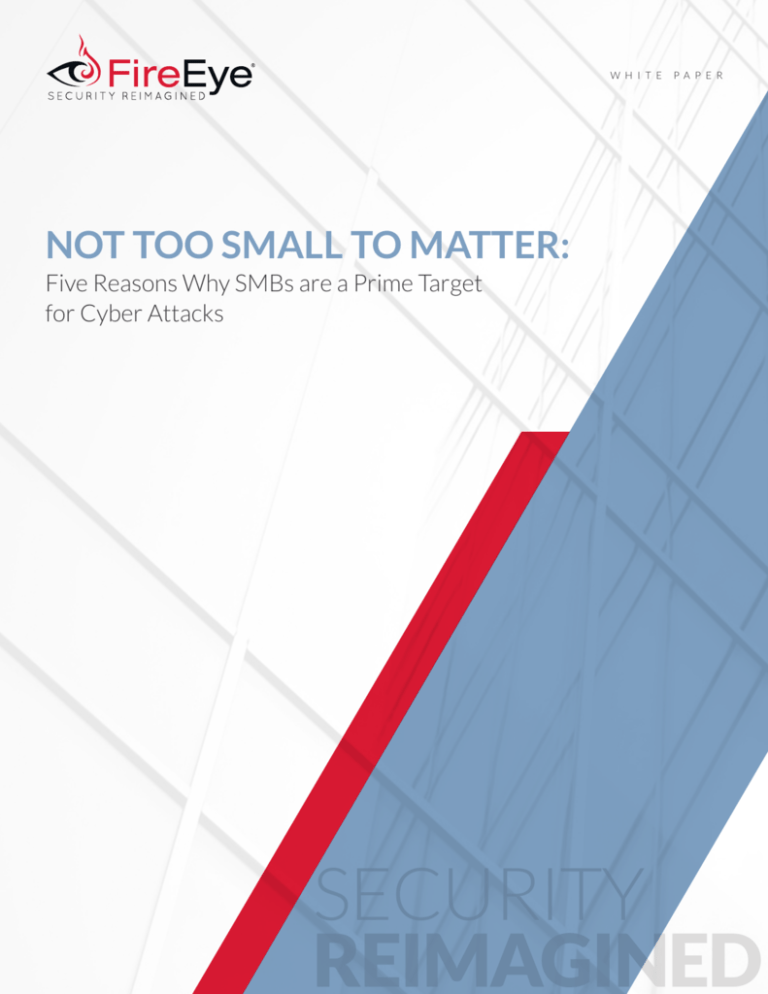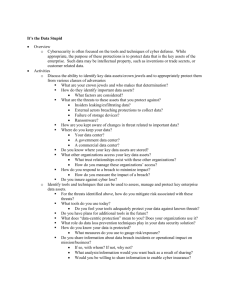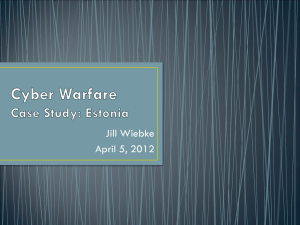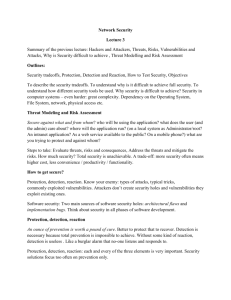
W H I T E
P A P E R
NOT TOO SMALL TO MATTER:
Five Reasons Why SMBs are a Prime Target
for Cyber Attacks
SECURITY
REIMAGINED
WHITE PAPER
Five Reasons Why SMBs are a Prime Target for Cyber Attacks
CONTENTS
Introduction3
Advanced Attacks: Not Just for the Big Guys
4
Reason No. 1: Your Data Is More Valuable than You Think5
Reason No. 2: Cyber Attacks Offer Low Risk and High Returns for Criminals
6
Reason No. 3: You’re an Easier Target
7
Reason No. 4: Many SMBs Have Their Guards Down
8
Reason No. 5: Most SMB Security Tools Are No Match Against Today’s Attacks
9
Conclusion and Recommendations
10
About FireEye
11
2
WHITE PAPER
Five Reasons Why SMBs are a Prime Target for Cyber Attacks
Introduction
Starting a small business is an inherently risky venture. You may not have enough
capital, your product may be flawed, or you could be entering the market at the
wrong time. But today you have to add another inherent risk—cyber crime.
While breaches of name-brand companies grab the headlines, cyber attackers are
increasingly targeting small and midsize businesses (SMBs) as well.
While one small business in isolation may not
seem like a worthwhile target for a cyber attack,
collectively they are a goldmine. In addition to
creating 64% of net new jobs in the U.S.,1 these
economic mainstays account for 54% of all U.S.
sales and about half of all private-sector payrolls.2
While smaller companies can be just as desirable
a cyber target as larger ones, they tend to lack
the resources or experience to develop a robust
security posture against attackers compared to
larger organizations.
But given their vital role in the economy, it’s no
surprise that the smaller firms face a growing tide
of cyber attacks. According to the Verizon 2013
Data Breach Investigations Report, small and
midsize businesses suffered data breaches more
often than did larger firms.3
“The ‘I’m too small to be a target’ argument
doesn’t hold water,” the Verizon report states. “We
see victims of espionage campaigns ranging from
large multi-nationals all the way down to those
that have no staff at all.”4
A New York mannequin maker learned that
lesson the hard way in 2012 when it lost $1.2
million within a matter of hours through a series
of fraudulent wire transfers. Cyber criminals
breached the 100-employee firm and got its online
banking credentials. The company’s anti-virus (AV)
software never detected anything amiss.5
The cost of data breaches can devastate a small
or midsize business. According to a Ponemon
Institute 2015 report, data breaches cost U.S.
companies $6.5 million per breach on average, up
from $5.85 million in 2014. That amounts to $217
per stolen record, up from $201 the year before.6
And those figures don’t include potential liability
issues for the target or the incalculable damage a
data breach can wreak on a business’ reputation.
Business disruption alone can cost more than
$937,000 per breach, the Ponemon Institute
estimates.7 That figure might be bearable for a
large enterprise, but would damage most SMBs.
This paper explains targeted attacks and examines
five reasons cyber attackers are aiming at small to
midsize businesses.
U.S. Small Business Administration. “Small Business GDP: Update 2002-2010.” January 2012.
U.S. Small Business Administration. “Small Business Trends.” Nov. 2013.
3
Verizon. “2013 Data Breach Investigations Report.” May 2013.
4
Ibid.
5
Sarah E. Needleman (The New York Times). “Cybercriminals Sniff Out Vulnerable Firms.” July 2012.
6
Ponemon Institute. “2015 Cost of Data Breach Study: Global Analysis.”
7
Ibid.
1
2
3
WHITE PAPER
Five Reasons Why SMBs are a Prime Target for Cyber Attacks
Advanced Attacks:
Not Just for the Big Guys
N
ews headlines tend to highlight widescale attacks against large enterprises,
spectacular attacks that hit millions of
customers. But most attacks actually target small
and midsize businesses. And in relative terms,
these attacks often are much more costly to
smaller targets.
Unlike the broad, scattershot attacks of the
past, today’s cyber assaults are well funded, well
organized, and laser focused. The new generation
of attacks is focused on acquiring something
valuable—sensitive personal details, intellectual
property, authentication credentials, insider
information, and the like.
Cyber threat actors often lay the groundwork
with early reconnaissance. So they know what to
look for, where to look, and all too often, the weak
links in your cyber defenses.
From there, each attack often cuts across multiple
threat vectors—web, email, file, and mobile—and
unfolds in multiple stages. With calculated steps,
malware gets in, signals back out of the breached
network, and gets valuables out.
Adding insult to injury, cyber criminals often
use compromised SMB networks to launch
attacks against other targets. As many as 30,000
websites are infected every day, according to one
estimate—and 80% of those belong to legitimate
small businesses.8
Targeting small and midsize businesses makes
more sense than it might seem. Cyber criminal
groups are ruthlessly efficient. They want the
biggest bang for their buck, which often means the
SMB segment. The following sections outline five
reasons that make small and midsize businesses
especially inviting targets.
Targeting small and midsize businesses makes
more sense than it might seem. Cyber criminal
groups are ruthlessly efficient. They want the
biggest bang for their buck.
Alastair Stevenson (V3). “Hackers target 30,000 SME websites per day to spread malware.” June 2013.
8
4
WHITE PAPER
Five Reasons Why SMBs are a Prime Target for Cyber Attacks
Reason No. 1:
Your Data Is More Valuable than You Think
Even if you’re not the ultimate target—and even
if your direct partners aren’t—only a few hops
separate you from a valuable target.
M
ost businesses have information they want
to keep secret.
It might be customers’ credit card numbers. It
could be employees’ personal data. Or, as in the
case of the mannequin maker, it might be
something as valuable as the keys to the business
banking account.
The question isn’t whether cyber criminals are
targeting businesses like yours, but which
criminals—and what they’re after.
In addition to having valuable data of their own,
most SMBs do business with larger companies.
Often this includes deep ties into partners’
computer systems as part of an integrated supply
chain or access to their sensitive data and
intellectual property.
Think of it as six degrees of separation for
business. Even if you’re not the ultimate target—
and even if your direct partners aren’t—only a few
hops separate you from a valuable target.
“It might not be your data they’re after at all,” the
Verizon report states. “If your organization does
business with others that fall within the espionage
crosshairs, you might make a great pivot point into
their environment.”
You might think of yourself as a small fish, but
you’re connected to bigger fish.
VALUABLE DATA
$217
A data breach costs $
217 per
stolen record on average.
(Source: Ponemon Institute)
5
WHITE PAPER
Five Reasons Why SMBs are a Prime Target for Cyber Attacks
Reason No. 2:
Cyber Attacks Offer Low Risk and
High Returns for Criminals
Attackers are rarely caught, let alone punished. In
many cases, attackers are even sponsored by
their home government.
T
he Internet has connected the globe in
ways barely conceivable just a few decades
ago. It has opened up remote markets,
uncovered lucrative niches to serve, and created
brand new ways of doing business.
The dark side of this progress: the Internet has
also made attacks possible from anywhere in the
world. Attackers are rarely caught, let alone
punished. In many cases, attackers are even
sponsored by their home government.9
Advanced malware typically resides in infected
systems for weeks, even months, before common
security tools detect it.10 Some malware quietly
cleans up after itself after exfiltrating data to make
a clean getaway.11 Others make sure to leave few
traces in the first place, running solely in computer
memory so that no artifacts are left on the
compromised machine’s storage.12
LOW RISK, HIGH RETURNS
10%
Only 10% of cyber
crimes reported
to police result in
a conviction.
(Source: United Nations Office on Drugs and Crime.)
Those factors are amplified when it comes to
SMBs, which are usually less able than their larger
counterparts to detect and counter advanced
threats. With much to gain and little to lose, cyber
attackers have strong incentives to attack.
U.S. Department of Defense. “Annual Report to Congress: Military and Security Developments Involving the People’s Republic of China 2013.” May 2013.
Mandiant, a FireEye Company. “M-Trends 2015: A View From the Frontlines.” February 2015.
11
Lucian Constantin (IDG News Service). “Flame authors order infected computers to remove all traces of the malware.” June 2012.
12
Ned Moran, Sai Omkar Vashisht, et al. (FireEye). "Operation Ephemeral Hydra: IE Zero-Day Linked to DeputyDog Uses Diskless Method." November 2013.
9
10
6
WHITE PAPER
Five Reasons Why SMBs are a Prime Target for Cyber Attacks
Reason No. 3:
You’re an Easier Target
S
mall and midsize businesses are facing the
same cyber threats as large enterprises, but
have a fraction of the budget to deal with
them. More than 40% don’t have an adequate IT
security budget, according to a November 2013
survey by the Ponemon Institute.13
Most small businesses cannot afford layered
“defense-in-depth” security employed by large
enterprises. And even if they could, most of these
defenses are futile anyway. (See Reason No. 5:
“Most SMB security tools are no match against
today’s attacks.”)
Unlike big corporations—with dedicated roles for
chief information security officer, chief information
officer, and the like—the typical IT director at a small
or midsize business wears many hats. Only 26% of
small and midsize businesses in the Ponemon survey
were confident their firm has enough in-house
expertise for a strong security posture.14
Likewise, many smaller companies lack strong
security procedures and policies. Only 36% of
small business owners have data security policies,
according to a September 2013 survey sponsored
by Bank of the West.16
While nearly one third of SMBs surveyed consider
their CIO the go-to person for IT security matters,
another one-third said “no one function
determines IT security priorities.”15
Most cyber attackers follow the path of least
resistance. In many cases, this means targeting the
very businesses that can least afford to be hit.
Only 26% of small and midsize businesses in a
Ponemon survey were confident their firm has
enough in-house expertise for a strong
security posture.
Ponemon Institute. “The Risk of an Uncertain Security Strategy Study of Global IT Practitioners in SMB Organizations.” November 2013
Ibid.
15
Ibid.
16
Harris Interactive. “Fighting Fraud: Small Business Owner Attitudes about Fraud Prevention and Security.” September 2013.
13
14
7
WHITE PAPER
Five Reasons Why SMBs are a Prime Target for Cyber Attacks
Reason No. 4:
Many SMBs Have Their Guards Down
FROM THE VERIZON
DATA BREACH
INVESTIGATIONS
REPORT (2013)
T
he statistics are clear: a small or midsize business
is more likely—not less—to face a cyber attack
compared with large enterprises.
And yet nearly 60% of small and midsize businesses in
the Ponemon survey don’t consider cyber attacks a big
risk to their organization. And 44% don’t consider strong
security a priority.17
Despite a growing tide of cyber attacks, 77% of SMBs
believe that their company is safe from cyber attacks,
“showing that some small businesses are operating
under a false sense of security.”18
Many businesses assume that they don’t have anything
worth stealing (see Reason No. 1: Your data is more
valuable than you think). Others are unaware of the
volume and sophistication of today’s attacks.
Am I a target of
espionage? Some may
already know the answer
to this question by
first-hand experience.
Many others assume
they aren’t or haven’t
thought much about
it. Despite the growing
number of disclosures
and sometimes alarmist
news coverage, many
still see espionage as a
problem relevant only to
the Googles of the world.
Unfortunately, this is
simply not true.19
In either case, the effect is the same: the business
remains vulnerable.
Despite a growing tide of cyber
attacks, 77% of SMBs believe that
their company is safe from cyber
attacks, “showing that some small
businesses are operating under a
false sense of security.”
Harris Interactive. “Fighting Fraud: Small Business Owner Attitudes about Fraud Prevention and Security.” September 2013.
National Cyber Security Alliance. “America’s Small Businesses Must Take Online Security More Seriously.” September 2013.
19
Verizon. “2013 Data Breach Investigations Report.” May 2013.
17
18
8
WHITE PAPER
Five Reasons Why SMBs are a Prime Target for Cyber Attacks
Reason No. 5:
Most SMB Security Tools Are No Match
Against Today’s Attacks
Firewalls, next-generation firewalls, intrusion
prevention systems (IPS), AV software, and
gateways remain important security defenses.
But they are woefully ineffective at stopping
targeted attacks.
96%
Attackers bypassed
multiple layers of
security in 96% of
deployments in a
real-world study.
(Source: FireEye and Mandiant)
T
he defenses most SMBs have in place
today are ill equipped to combat today’s
advanced attacks.
Firewalls, next-generation firewalls, intrusion
prevention systems (IPS), AV software, and
gateways remain important security defenses.
But they are woefully ineffective at stopping
targeted attacks.
These technologies rely on approaches such as
URL blacklists and signatures. By definition,
these approaches cannot stop dynamic attacks
that exploit zero-day vulnerabilities. If an IPS or
AV program does not have the signature of a new
exploit, it cannot stop it. When highly dynamic
malicious URLs are employed, URL blacklists do
not cut it.
Most defenses stop known attacks. But they
are defenseless against unknown advanced
targeted attacks.
9
WHITE PAPER
Five Reasons Why SMBs are a Prime Target for Cyber Attacks
Conclusions and Recommendations
M
ost cyber attackers are rational.
Attackers have strong incentives to
target your systems, with little potential
consequence. Given the value of your data, your
business cannot afford to ignore the threat—or
waste time and money on ineffective defenses.
Here are three key steps toward shielding your
business from the growing scourge of data breaches.
Assume you’re a target
Cyber attacks against small businesses rose 31%
in 2013 versus the year before, making them the
fastest-growing group of targets.20
Your data is valuable. And you likely have ties to
bigger, high-profile business partners. Given that
today’s advanced attacks can easily bypass most
security tools, you may have been breached and
not yet know it.
By assuming that you are in cyber attackers’
crosshairs, you can better prepare yourself
against the inevitable attack.
Identify your most valuable assets
and connections
You would never hire bodyguards and forget to tell
them whom they are supposed to be protecting.
In the same way, defending your IT systems starts
with identifying your most valuable assets.
That step might be trickier than it sounds.
Information that seems ordinary to you—say, the
name of a business contact’s executive assistant—
could help cyber attackers forge a spear-phishing
email that compromises a vital partner.
Deploy a security platform built to
combat today’s advanced attacks
A widening gap between threat actors’ offensive
abilities and badly outdated defenses has left
organizations more vulnerable than ever.
Today’s attacks exploit previously unknown,
zero-day vulnerabilities, easily bypassing
signature- and reputation-based defenses. And
file-based sandboxes, touted by legacy vendors
as their fresh approach to security, are
constrained by many of the same flaws as
traditional security products.
Even with constant updates, standard security
products —traditional and next-generation
firewalls, IPS, gateways, and AV software—cannot
keep up with today’s fast-moving, ever-evolving
threats. By the time most products can update
their databases of known malware and high-risk
web addresses, attackers have fashioned new,
undetectable attacks.
SMBs must take a radically different approach.
They need a security platform that can detect,
prevent, analyze, and respond to both known and
unknown threats before they have a chance to
steal your data, hurt your business, and tarnish
your reputation.
To learn more about advanced attacks and how
FireEye can help protect your small or midsize
business, visit www.fireeye.com.
Identify potentially valuable data and how it could
be vulnerable to well-funded, highly organized
attackers. That crucial step will help spot the
weakest links in your security system and highlight
what you need to do to protect your assets.
20
Verizon. “2013 Data Breach Investigations Report.” May 2013.
10
To learn more about FireEye, visit:
www.fireeye.com
About FireEye
FireEye protects the most valuable assets in the
world from those who have them in their sights.
Our combination of technology, intelligence, and
expertise — reinforced with the most aggressive
incident response team — helps eliminate the
impact of security breaches. We find and stop
attackers at every stage of an incursion. With
FireEye, you’ll detect attacks as they happen. You’ll
understand the risk these attacks pose to your
most valued assets. And you’ll have the resources
to quickly respond and resolve security incidents.
The FireEye Global Defense Community includes
more than 2,700 customers across 67 countries,
including over 157 of the Fortune 500.
FireEye, Inc. | 1440 McCarthy Blvd. Milpitas, CA 95035 | 408.321.6300 | 877.FIREEYE (347.3393) | info@fireeye.com | www.fireeye.com
© 2015 FireEye, Inc. All rights reserved. FireEye is a registered trademark of
FireEye, Inc. All other brands, products, or service names are or may be trademarks
or service marks of their respective owners. WP.NTSTM.EN-US.05202015







